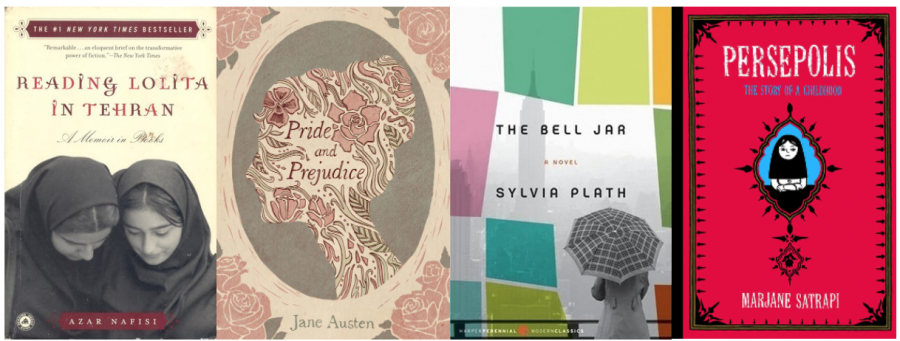Book by women for women
March 13, 2019
In honor of International Women’s Day last week, here are a couple of books written by feminists in a time or culture wherein feminist ideologies were not met with open arms.
“The Bell Jar” by Sylvia Plath
Plath wrote her award-winning novel under the pseudonym Victoria Lucas in 1963. The book may be old, but it’s best described as Edgar Allan Poe meets twisty feminism. It follows the narrator down a spiraling plummet into madness. Plath killed herself one month after the book was published. Despite the darkness surrounding the author herself, the book tackles issues of social inequality — especially through the frame of premarital sex and conflicting expectations of men and women. The protagonist, Esther, survives and the novel ends on a hopeful note, despite her multitude of suicide attempts throughout. Plath evokes empowerment when her narrator is most unsure of herself.
“When they asked me what I wanted to be I said I didn’t know.
‘Oh, sure you know’ the photographer said.
‘She wants,’ said Jay Cee wittily, ‘to be everything.’”
“Pride and Prejudice” by Jane Austen
“It is a truth universally acknowledged” that Jane Austen was a feminist well ahead of her time.
“Pride and Prejudice” revolves around the five unmarried Bennet sisters, namely, Elizabeth Bennet. Their mother is desperate to match her daughters with one of the two rich gentlemen that sauntered into their small village.
Her most independent daughter, Elizabeth, quickly draws the attention of Mr. Darcy, one of the aforementioned wealthy gentlemen. Unlike every other woman he encounters, Elizabeth doesn’t go weak in the knees as soon as Mr. Darcy pays her attention. Instead, she stands her fierce, female ground and makes him work a little harder than any man would have had to in the late 18th century.
Elizabeth Bennet unapologetically rejects the current society’s expectations of a woman’s role and how she should act in the company of a suitor. She refuses to be made to feel small just because society demands she conform to its idea of womanhood.
“There is a stubbornness about me that never can bear to be frightened at the will of others. My courage always rises at every attempt to intimidate me.”
“Reading Lolita in Tehran” by Azar Nafisi
Nafisi wrote her memoir about the time she spent in Iran during the revolution, while the people were living under the rule of the Islamic Republic of Iran. It is framed through the perspective of seven female students who meet at Nafisi’s house for a weekly book club. The club discusses issues of imprisonment, oppression and politics in a society where women don’t experience nearly as many freedoms as Americans.
Nafisi is dismissed from her teaching position for refusing to wear a veil, an act she argues is a government attempt to silence liberal-minded professors.
At a book club meeting, she and the other young women discuss Jane Austen’s “Pride and Prejudice,” and discuss ideas of marriage, men and sex in the novel.
Nafisi inspires the young writers and literature-lovers in her book club to seek creativity, even in a culture where individualism is habitually squashed.
“None of us can avoid being contaminated by the world’s evils; it’s all a matter of what attitude you take towards them.”
“Persepolis” by Marjane Satrapi
“Persepolis” isn’t a mere novel about the trials and tribulations of womanhood in Iran; it’s instead a graphic autobiography, or graphic novel written and illustrated by Satrapi, who was a child during Iran’s political and religious time of turmoil in 1980.
Satrapi was a fiery young woman who sought to fight social inequalities under an increasingly strict regime. Because of her tendency to speak out against and reject authority, she is suspended from school. With bombs decimating neighborhoods and killing Satrapi’s friends and family members, her parents decide to ship her off to a boarding school in Vienna.
She struggles against her religion and beliefs, and eventually goes back to Iran, only to leave again years later.
She fights against sexual harassment both inside the workplace and out on the streets.
“Listen. I don’t like to preach, but here’s some advice. You’ll meet a lot of jerks in life. If they hurt you, remember it’s because they’re stupid. Don’t react to their cruelty. There’s nothing worse than bitterness and revenge. Keep your dignity and be true to yourself.”






















